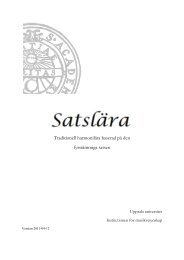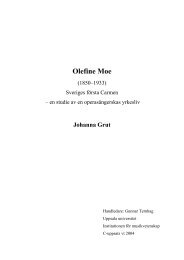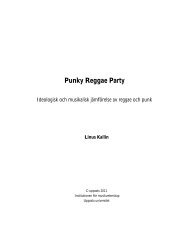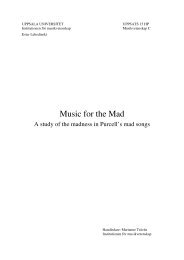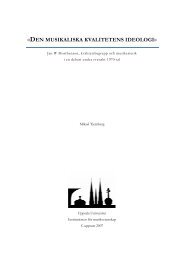What Does Donna Lee Mean? - Institutionen för musikvetenskap ...
What Does Donna Lee Mean? - Institutionen för musikvetenskap ...
What Does Donna Lee Mean? - Institutionen för musikvetenskap ...
You also want an ePaper? Increase the reach of your titles
YUMPU automatically turns print PDFs into web optimized ePapers that Google loves.
this guy is considered the ”best bass player in the world” when he plays ”outdated licks like<br />
the guys in the 40s”.<br />
The ”open” work of art<br />
During the last decades of the 20th century, the positivistic aspirations of structuralist<br />
approaches to meaning in music have been highly criticized. Semiotics in general and musical<br />
semiotics in particular have rediscovered the importance of the listener’s part in constructing<br />
the meaning of a particular work. Long gone is the figure of the authoritarian musicologist<br />
who determines canonical interpretations of classical masterpieces. Musical semiotics has<br />
been much influenced by the latest developments in cognitive sciences. The traditional<br />
historical – systematical methodologies of musical investigation have witnessed the<br />
emergence of new areas of investigation, in what some have seen as a case of interdisciplinar<br />
dilettantism and an exageration of the importance placed on those areas traditionally<br />
considered as auxiliar to musicology. In any case, music has been seen through the prisms of<br />
sociology, psychology in its many different approaches, cybernetics, neurology, system<br />
theory, anthropology, linguistics, etc.<br />
A large number of current psychologysts, especially those in the filed of cognitive<br />
psychology, seem to have consensuated that to consider the meaning of a work of art is an<br />
individual process of creation. When one considers a sonata, a painting or a sculpture, one<br />
generates an interconnected chain of interpretations, reactions and meanings that are not<br />
necessarily inferred by another person. Thus, there is always an element of impredictability<br />
which brings us to the epistemic problem of how to study a phenomenon that is unpredictable,<br />
dynamic, overproductive and individual.<br />
Musical competency<br />
Long gone are the times when Deryck Cooke tried to elaborate a musical dictionary in his<br />
famous The language of music (1959), where he intended to attribute rigid and univocal<br />
meanings to chords and tone combinations. The structuralist dream was to find stable<br />
correlations between musical structures and specific expressive meanings which allowed to<br />
state a canonical ”musical code” which would allow to interpret just about any piece of<br />
music. Musical analysis saw the need of going beyond the intrinsecal characteristics of the<br />
musical object and start considering the role of the musical competency of the interpreting<br />
subject or receiver which is the final responsible fo the construction of meaning.<br />
One of the first and foremost attempts to present this subject and build a theory<br />
around it was La competenza musicale of Gino Stefani. This author defines musical<br />
competency as ”the overall hability to make sense out of music” (1982:9). It is obvious that,<br />
even if one is very knowledged in a specific type of music, one cannot be proficient in all<br />
23



